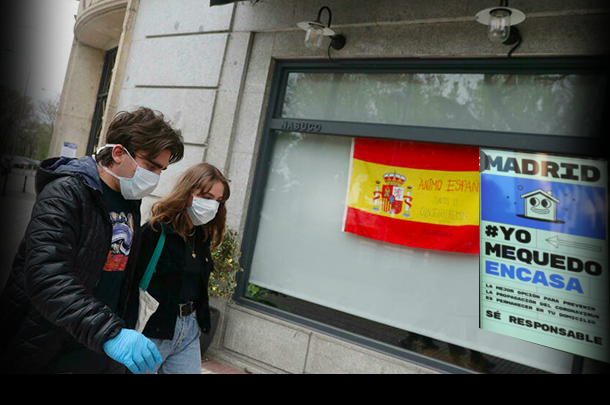The Constitutional Court has concluded that the government should have resorted to a state of emergency – which requires prior parliamentary approval – to limit fundamental rights for the nationwide lockdown

Spain is the latest EU member state to fall foul of its own laws and constitution, having imposed permanent draconian laws and restrictions starting with the initial mass hysteria of the alleged ‘global pandemic’ in March 2020 – and still carrying on with measures in 2021.
The legal battleground here is familiar one: many governments have bypassed normal legislative due process and democracy in favour of an authoritarian-style ‘rule by decree.’ Rather than go through the normal democratic checks and balances required to prove the basis for, and declare a ‘state of emergency’ (and risk having to actually prove ‘the science’ being used to impose a state of emergency), governments have cleverly bypassed this process by simply declaring a vague and arbitrary ‘state of alarm’ – effectively giving itself carte blanche to do what it wants as long as it wants, and make endless changes to the parameters of its decree over time, creating what has become a never ending crisis.
When challenged in the country’s top constitutional court, the ill-conceived lockdown power-grab has been found illegal.
Spain’s El Pais reports…
Spain’s Constitutional Court has ruled that the state of alarm that was implemented by the central government in March 2020 at the outset of the coronavirus pandemic was unconstitutional. In a close vote of six against five, the judges found that such a lockdown, which saw Spaniards confined to their homes apart from for essential activities such as buying food, should have been imposed under the next emergency situation under Spanish law, the state of emergency. This would have required the prior approval of the lower house of parliament, the Congress of Deputies.
The decision has been reached by the Constitutional Court after two meetings of the judges, during which a draft sentence on the state of alarm written by magistrate Pedro González Trevijano – from the court’s conservative sector – was debated. In the text, the judge argued that the state of alarm imposed by the government last March did not just limit the fundamental rights of free circulation and of assembly between private citizens, but suspended them altogether.
Ever since the coronavirus pandemic arrived in Spain, there has been a debate among constitutional experts as to whether a state of emergency was needed. Article 116 of the Spanish Constitution describes three legal categories for emergency situations: state of alarm, state of emergency and state of siege (in Spanish: estado de alarma, estado de excepción and estado de sitio).
For some of those involved in the debate, the state of alarm granted sufficient legal coverage to limit some of these rights, while for others the lockdown was, in practice, such an intense restriction that it was equivalent to the suppression of fundamental rights, thus requiring a state of emergency.
Another key difference relates to the fact that a state of alarm is initially agreed on by the government and subsequently debated in Congress, where it is approved or rejected by deputies. This allows the executive to act with a certain level of speed once a decision has been taken to go down this route – i.e. parliamentary control is exercised after the state of alarm has been implemented.
In contrast, a state of emergency is not directly agreed by the government. The proposal is first taken to Congress, and it is parliament that declares the emergency situation.
One of the serious drawbacks to a state of emergency would have been the more severe restrictions on fundamental rights that it would have brought with it. Legal experts have pointed to the fact that a state of emergency is subject to less oversight, and allows the police to increase the time that they can detain people from three to 10 days with no judicial supervision. Police can also enter homes or establishments with the use of force – i.e. knocking down the door – when they deem it necessary, and also without any prior authorization from the courts. The authorities can also close down media outlets under a state of emergency, all in the name of maintaining public order.
Other constitutionalists have defended that the use of the state of alarm during the first stage of the pandemic – a measure that was initially backed by parties of all ideological stripes in Congress – was the appropriate move in a health emergency such as the coronavirus crisis. They argued that the state of emergency should be used when serious public order problems are occuring.
In any event, the point on which the judges from the Constitutional Court agreed from the start was that any annulment of the lockdown that was in place between March and June last year should not involve any kind of liability for the state. As such, there was agreement that no claims could be filed by any businesses or private citizens who suffered economic losses as a result of the state of alarm…
Continue this report at El Pais















